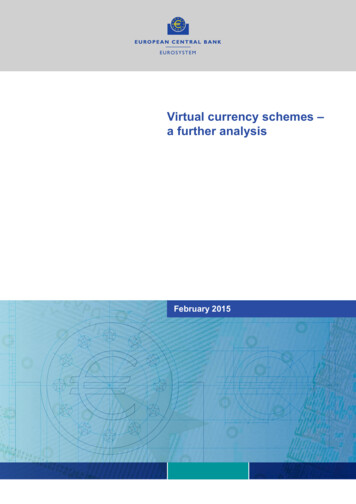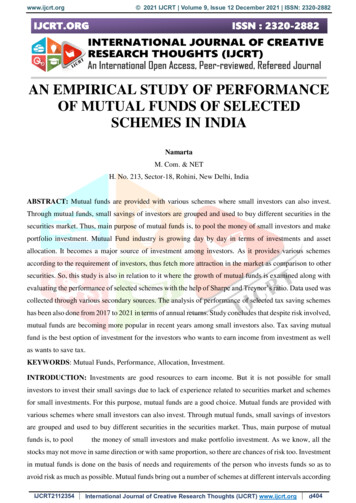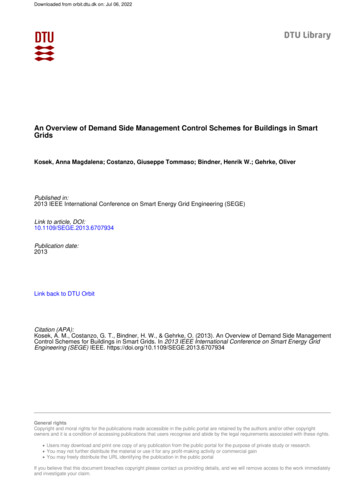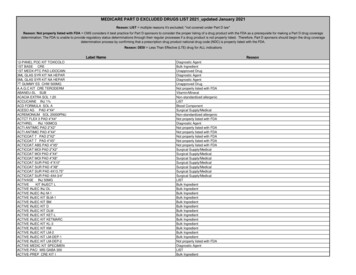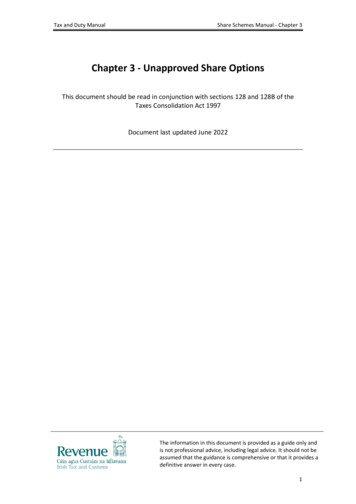
Transcription
Tax and Duty ManualShare Schemes Manual - Chapter 3Chapter 3 - Unapproved Share OptionsThis document should be read in conjunction with sections 128 and 128B of theTaxes Consolidation Act 1997Document last updated June 2022The information in this document is provided as a guide only andis not professional advice, including legal advice. It should not beassumed that the guidance is comprehensive or that it provides adefinitive answer in every case.1
Tax and Duty ManualShare Schemes Manual - Chapter 3Table of Contents3.1 Introduction .33.2 Summary of Tax Treatment of Unapproved Share Options .43.3 Charge to Tax .53.3.1 Scope of Section 128 TCA 1997 .53.3.2 Schedule E Charge .53.3.3 Non-Residents .63.4 Tax Treatment of Share Options .73.4.1 Date of Grant.73.4.2 Short Options - Tax at Date of Grant.73.4.3 Long Options - Tax at Date of Grant.73.4.4 Tax at Exercise, Assignment or Release.83.4.5 Short Options – Tax at Date of Exercise .83.4.6 Long Options – Tax at Date of Exercise .93.4.7 Assignment or Release of Share Options .113.4.8 Cashless Exercise .123.4.9 Gain Realised by Someone Other than the Employee/Director.133.4.10 Bankruptcy .143.4.11 Death of Option Holder.143.4.12 Foreign Exchange .143.4.13 Impact on Pension Plan .143.5 Exchange of Share Options .153.6 Payment of Relevant Tax on Share Options (“RTSO”).163.6.1 Overview .163.6.2 Payment of USC and PRSI.173.6.3 Late Payment of RTSO .173.6.4 Self-Assessment .173.6.5 Late Filing Surcharge .173.6.6 Preliminary Tax.183.7 Employer Reporting .193.7.1 Annual Return .193.8 Capital Gains Tax .203.8.1 General.203.8.2 Acquisition Costs where Shares are Newly Issued Shares.203.8.3 Acquisition Costs where the Shares are Already in Existence.213.8.4 Identification of Shares .213.9 International Aspects – Share Options.233.9.1 General.233.9.2 Interpretation of Relevant Provisions of Irish DTAs based on OECD ModelTax Convention .233.9.3 Income from Employment Article of DTAs.233.9.3.1 Employment Income.233.9.3.2 Period of Employment for which Share Options have been Granted.243.9.3.3 Share Option Granted when Resident of Ireland and Exercised whenResident of a DTA country .251
Tax and Duty ManualShare Schemes Manual - Chapter 33.9.3.4Share Options Granted to an Employee while a Resident of a DTACountry and Part of Referable Employment Exercised in Ireland .253.9.3.5 Non-Resident Individuals None of whose Duties of Employment areExercised in the State .263.9.3.6 Share Options Granted in respect of an Irish Employment but Part ofthe Period of Employment for which the Share Option was Grantedwas Exercised in a Non-DTA Country.263.9.4 Directors’ Fees Article .263.9.5 Capital Gains Tax (CGT) on Disposal of Shares Acquired.273.9.6 Interaction of RTSO and Double Taxation Relief .273.9.7 Long Option - Credit where Charge to Income Tax Imposed at the Date ofGrant.283.10 International Aspects - Examples .292
Tax and Duty ManualShare Schemes Manual - Chapter 33.1 IntroductionThis chapter explains the tax treatment of rights obtained by directors andemployees to acquire shares, otherwise than through a Revenue approved savingsrelated share options (SAYE) scheme or a preferential scheme such as the KeyEmployee Engagement Programme (“KEEP”).When a company grants a share option to an employee/director, they are given theright to acquire a pre-determined number of shares at a pre-determined price for apredetermined period. Such option schemes are commonly referred to as“unapproved share option schemes”.Where a company grants a share option to an employee/director, it will generallyissue documentation covering the following: the number of shares that the employee/ director can acquire, the price that the employee director has to pay for the shares (“OptionPrice”), the dates from which, and by which the employee/director may exercise hisor her option (“Exercise Period”), and the conditions regarding the right to exercise the option, which may includegood leaver and/or bad leaver provisions.The “date of exercise” is the date at which the employee/director takes up their rightto acquire shares.The shares may be at no cost to the employee/director (nil option) or at a predetermined price that the employer has set.In some cases, the employee/director may have to pay something for the optionitself, but the terms and conditions will be set by the employer.There are two types of share options for tax purposes:(a) a ‘short option’ - which must be exercised within seven years from the date itis granted; and(b) a ‘long option’ - which can be exercised more than seven years from the dateit is granted.3
Tax and Duty ManualShare Schemes Manual - Chapter 33.2 Summary of Tax Treatment of Unapproved Share OptionsGrant ofoptionsTax at grantResponsibility for collecting taxEmployee reportingEmployer reportingTax at exerciseExerciseofoptionsResponsibility for payment oftaxEmployee reportingEmployer reportingTax at saleDisposalofsharesNo 1N/ANoYes - form RSS1 must be filed by 31March following year of grantYes – income tax, USC & PRSI atmarginal rates 2Employee – must pay within 30 daysof exerciseYes – must complete form RTSO1within 30 days of exercise and mustfile income tax return for year ofexerciseYes – form RSS1 must be filed by 31March following year of exerciseYes – charge to capital gains tax (CGT)on any gain realised 3Responsibility for payment oftaxEmployeeEmployee reportingYes – an individual must file a returnby 31 October in the year after thedate of disposal. A return is requiredeven if no tax is due because of reliefsor losses. An individual must file aForm CG1 if not usually required tosubmit annual tax returns; Form 12 ifa PAYE worker or a Form 11 ifconsidered a chargeable person fortax purposes.Employer reportingNoAssumes options are not capable of being exercised more than seven years following the date ofgrant.1Marginal rates of income tax and USC must apply, unless the taxpayer applies for and receives priorapproval to apply tax at the standard rate of income tax and a lower USC rate.2Must pay any CGT due by 15 December for disposals between 1 January and 30 November of thesame year. Tax is due by 31 January for disposals in the immediately preceding December.34
Tax and Duty ManualShare Schemes Manual - Chapter 33.3 Charge to Tax3.3.1 Scope of Section 128 TCA 1997Where an employee/ director, by reason of their employment/office, obtains a rightto acquire shares (“share option”) or any other asset(s) in any company, legislationprovides for income tax and capital gains tax consequences.Specifically, section 128 TCA 1997 applies to any right granted to an employee/director by reason of their employment/ office to acquire any asset or assetsincluding shares in any company. “Shares” is defined as including stock andsecurities.A charge under section 128 TCA 1997 also arises where: a right is granted by reason of an employee/director’s employment/office orwhich is assigned to him or her by another person, or a right is granted to an employee/director before the commencement of theemployment/office or after the cessation of the employment/office where itis acquired by reason of the employment/ office. For example, an employeemay be granted share options as an inducement to take up employment.3.3.2 Schedule E ChargeThe charge to income tax under section 128 TCA 1997 applies toemployees/directors who are chargeable to tax under Schedule D or Schedule E inrespect of the emoluments of their employment/ office.It does not matter whether the profits or gains from the employment/office oremployment in question are chargeable to income tax under Schedule E or Case III ofSchedule D, the charge under section 128 will always be under Schedule E.Under Section 128 TCA 1997 an individual is liable to income tax under Schedule E inrespect of any gain arising on the exercise, assignment or release of a right obtainedby that person where(a) the right has been obtained by reason of that person’s employment/office(whether or not a right is obtained by reason of a person’semployment/office is a question of fact); and(b) section 71(3) TCA 1997 (i.e. the remittance basis of taxation) does not applyto the profits or gains from the relevant employment/ office under which theright is or was granted. See Tax and Duty Manual (TDM) Part 05-01-21A onthe Revenue website for more information on the remittance basis oftaxation.5
Tax and Duty ManualShare Schemes Manual - Chapter 3The amount of the gain as computed is chargeable under Schedule E in the year inwhich the right is exercised, assigned or released.3.3.3 Non-ResidentsWith effect from 5 April 2007 section 128 TCA 1997 also applies to cases where theemployee/director is not resident in the State when the right is granted (see Section3.9 for more information regarding residence and share options).6
Tax and Duty ManualShare Schemes Manual - Chapter 33.4 Tax Treatment of Share Options3.4.1 Date of GrantThe date of grant is the date at which the employee/director is granted the right toacquire shares in the future. This is a right which the employee may or may notchoose to take up in the future.3.4.2 Short Options - Tax at Date of GrantWhere a share option is not capable of being exercised more than seven years afterthe date on which it is granted (i.e. a short option) no charge to income tax arises onthe date that the right is granted.3.4.3 Long Options - Tax at Date of GrantWhere a share option is capable of being exercised more than seven years after it isgranted (i.e. a long option) a charge to income tax may arise on both:(a)(b)the grant of the share option (where the option price is less than themarket value of the shares); andthe exercise, assignment or release of the share option.Credit is given for any income tax charged on the grant of the share option againstthe income tax due on the exercise, assignment or release of the share option.The amount of the gain chargeable to income tax on the grant of a long option is thedifference between:(a)(b)the market value of the share(s) at the date the share option is granted;andthe consideration for which the share(s) may be obtained on the exerciseof the share option (i.e. the exercise price). If this consideration isvariable the least amount of the consideration should be taken intoaccount.In practice, where an employee/director is granted a long option, the option pricewill, generally speaking, be equal to the market value of the shares at the date ofgrant, and consequently no income tax charge would arise at the date of grant.7
Tax and Duty ManualShare Schemes Manual - Chapter 3Example 1Orla was granted share options on 6 May 2021, under the terms of which the shareoption may be exercised anytime up to 6 May 2031. This is a ‘long option’ as it iscapable of being exercised more than seven years after the date of grant.Date share option grantedExercise PriceMarket Value at 6 May 2021Number of Shares6 May 2021 5.00 per share 5.50 per share1,000Value of shares at date of grantLess option price payable on exerciseIncome gain 5,500 5,000 500 4The total gain subject to income tax at the date of grant is 500 ( 0.50 per share x1,000 shares).If the individual’s marginal rate of income tax is 20%, then the income tax due is 100. If the individual’s marginal rate of tax is 40%, then the income tax due is 200.A credit for the tax charged on the grant of the option will be available for offsetagainst any income tax charged on the subsequent exercise, assignment or release ofthe share option.3.4.4 Tax at Exercise, Assignment or ReleaseIncome tax is chargeable under Schedule E on any gain realised on the exercise,assignment or release of a share option obtained by a person as anemployee/director. The amount chargeable to income tax is reckonable income forPRSI and USC purposes.3.4.5 Short Options – Tax at Date of ExerciseThe amount of the gain chargeable to income tax on the exercise of a short option isthe difference between:(a)(b)the market value of the share(s) at the date of acquisition; andthe aggregate amount or value of the consideration, if any, given for theshare(s) and for the grant of the share option.For the purposes of (b), consideration does not include the performance by theemployee/director of his or her duties in or in connection with his or heremployment/office and only one deduction may be allowed in respect of anyconsideration given for the grant of an option.4 PRSI and USC ignored for the purposes of this example.8
Tax and Duty ManualShare Schemes Manual - Chapter 3Example 2Thomas was granted share options on 6 May 2021, under the terms of which theshare options must be exercised before 1 December 2024. This is a ‘short option’ asit must be exercised within seven years of the date of grant.Date share option grantedExercise PriceMarket Value at 6 May 2021Number of SharesDate share option exercisedMarket Value at 10 March 20226 May 2021 2.00 per share 2.00 per share50010 March 2022 5.00 per shareThere is no charge to income tax at the date of grant as the option is a ‘short’ option.At the date of exercise in 2022, the taxable gain is calculated as follows:Market value of shares at date of exercise ( 5.00 per share)Less option price paid ( 2.00 per share)Income gain ( 3 per share) 2,500 1,000 1,5003.4.6 Long Options – Tax at Date of ExerciseWhere an individual can exercise a share option seven years after the date of grant,the amount of the gain chargeable to income tax on the exercise of that option is thedifference between:(a) the market value of the share(s) at the date of acquisition; and(b) the aggregate amount or value of the consideration, if any, given for theshare(s) and for the grant of the share option.For the purposes of (b), consideration does not include the performance by theemployee director of his or her duties in or in connection with his or heremployment/office and only one deduction may be allowed in respect of anyconsideration given for the grant of an option.However, credit is given for any income tax charged on the grant of the share optionagainst any income tax due on the exercise, assignment or release of the longoption.9
Tax and Duty ManualShare Schemes Manual - Chapter 3Example 3Orla was granted share options on 6 May 2020, under the terms of which the shareoptions may be exercised anytime up to 6 May 2028 (i.e. more than seven yearsafter the date of grant). This is a ‘long option’. Orla exercised all of her share optionson 4 May 2021.Date share option grantedExercise PriceMarket Value at 6 May 2020Number of SharesDate share option exercisedMarket Value at 4 May 20216 May 2020 5.00 per share 5.50 per share1,0004 May 2021 10.00 per shareThe total gain subject to income tax at the date of grant is 500 (1,000 shares x( 5.50 - 5.00)). If the individual’s marginal rate of income tax is 20%, then the income taxdue at grant is 100. If the individual’s marginal rate of tax is 40%, then the income tax due is 200.At the date of exercise on 4 May 2021, the taxable gain is calculated as follows:Value of shares at date of exerciseLess option price paid on exerciseIncome gain 10,000 5,000 5,000The total gain subject to income tax at the date of exercise in 2021 is 5,000 ( 5.00per share x 1,000 shares).However, the individual would be entitled to a credit for any income tax charged onthe grant of the share option.Depending on if the individual’s marginal rate of income tax is 20% or 40%, the netincome tax at the date of exercise in 2021 is calculated as follows:Income tax due on gain(gain X marginal rate)Less income tax paid at grantIncome tax payable at exercise20%40% 1,000 100 900 2,000 200 1,80010
Tax and Duty ManualShare Schemes Manual - Chapter 33.4.7 Assignment or Release of Share OptionsThe amount of the gain chargeable to income tax on the assignment or release of ashare option is the difference between:(a) the amount or value of the consideration for the assignment or release; and(b) the amount or value of any consideration given, if any, for the grant of theoption.For the purposes of (b), consideration does not include the performance by theemployee/ director of his or her duties in or in connection with his or heremployment/ office and only one deduction may be allowed in respect of anyconsideration given for the grant of an option.If a cash payment is received by an employee/ director on the release of a shareoption, this should be subject to PAYE and PRSI in the normal manner.11
Tax and Duty ManualShare Schemes Manual - Chapter 3Example 4Isobel was granted share options on 6 May 2020, under the terms of which the shareoptions must be exercised before 10 December 2022. Details of the option were asfollows:Date share options grantedExercise PriceMarket Value at 6 May 2020Number of Shares6 May 2020 2.00 per share 2.00 per share500On 1 December 2021, she released her options for a consideration of 3.00 for eachshare over which she held options.The 1,500 amount of cash consideration received is chargeable under Schedule E inDecember 2021.3.4.8 Cashless ExerciseA ‘cashless exercise’ is broadly the term given to an exercise of options whereby theemployee/director does not provide any cash to exercise the option and acquire theshares but rather requests the company sell the shares in order to finance theoriginal exercise and the tax liability on the gain realised on the exercise of the shareoption. This is also referred to as a “same day sale”. Notwithstanding that theexercise may be described as a ‘cashless exercise’, the income tax position remainsthe same. The employee/director will also need to consider any capital gains tax(CGT) implications of selling the shares.Example 5Ian was granted share options on 6 May 2020, under the terms of which the shareoptions must be exercised before 1 December 2023. This is a ‘short option’ as itmust be exercised within seven years of the date of grant.On 6 May 2021, Ian exercised his options and instructed his employer company tosell the required number of shares to cover the tax liability, and he agreed to pay forhis shares out of the proceeds of the sale.Date share option grantedExercise PriceMarket Value at 6 May 2020Number of SharesDate share option exercisedMarket Value at 6 May 20216 May 2020 2.00 per share 2.00 per share5006 May 2021 5.00 per share12
Tax and Duty ManualShare Schemes Manual - Chapter 3There is no charge to income tax at the date of grant as the option is a ‘short’ option.At the date of exercise, the taxable gain is calculated as follows:Value of each share at date of exercise of the optionLess option price paid on exerciseGain realised on the exercise of the share option 5.00 2.00 3.00 per shareThe total gain subject to income tax at the date of exercise is 1,500 ( 3.00 per sharex 500 shares).Assuming that Ian is a marginal rate taxpayer, he will be liable to pay income tax of 600 on the income gain arising (ignoring USC and PRSI for the purposes of thisexample). Ian’s employer will then need to sell enough shares to release enoughcash for Ian to cover the income tax arising. As the market value of the shares onthe date of exercise is 5 per share, Ian’s employer will need to sell 120 shares inorder to cover the taxes due (600/5 120) and 200 to cover the cost of the shares.For the purpose of calculating Capital Gains Tax, the shares sold will be identified asthose acquired on the date of exercise. This “share identification” rule applies as theshares have been sold within 4 weeks of acquisition. As Ian has acquired the sharesat 2 and is allowed a deduction in relation to the amount subject to income tax acapital gains tax liability will not arise. Ian will however be required to report detailsof the disposal when he files his annual return of income (Form 11) for 2021.Following the “sell to cover” mechanism, Ian will still have 180 shares. Where theremaining shares are sold following 4 weeks from the date of acquisition, the normalshare identification rules will apply in order to calculate the base cost of any futuredisposal of shares.See Section 3.8 for further information regarding the capital gains tax treatment.3.4.9 Gain Realised by Someone Other than the Employee/DirectorThere is an anti-avoidance provision in the legislation (section 128(6) TCA 1997) toprevent arrangements being put in place for someone other than the employee/director to realise the gain and thereby avoid the charge to income tax.A charge to income tax under section 128(6) TCA 1997 also applies in the case of again realised by virtue of a right obtained by reason of an employee/director’semployment/office even though the gain is realised by a person other than theemployee/director in the following circumstances—i.ii.where the right is granted to that other person,where the right was granted to the employee/director but subsequentlytransferred at less than the arm’s length price, or13
Tax and Duty Manualiii.iv.Share Schemes Manual - Chapter 3where the right was granted to the employee/director but subsequentlytransferred, to someone who is a connected person at the time the gain isrealised, orwhere the employee/director benefits directly or indirectly from the exercise,assignment or release of the right by the other person.A gain realised by another person includes a gain realised on the exercise of a rightby the employee/ director, where it is exercised by the employee/director asnominee or bare trustee, or otherwise on behalf of the other person.In the case of an assignment of a right, the gain realised must be reduced by theamount of any gain realised by the previous holder on the assignment of a right.3.4.10 BankruptcyWhere an employee/director is divested of a right following his or her bankruptcy oris otherwise divested of the right by operation of law, he or she is not chargeable toincome tax in respect of a gain realised by some other person from the exercise ofthe right. Instead, the other person is chargeable to income tax under Case IV ofSchedule D on any gain realised. The amount of the gain is computed in the sameway as it would have been if the employee/director had exercised the option.3.4.11 Death of Option HolderWhere the holder of a share option dies and the rules of the share option schemeallow the personal representatives to exercise the share option and acquire theshares over which the option was held, any gain realised on the exercise of theoption should be calculated in the normal manner in respect of the deceased personand the relevant income tax assessments made on the personal representatives intheir capacity as personal representatives of the deceased person.3.4.12 Foreign ExchangeIf the exercise price of a share option is denominated in a currency other than euro,the exchange rate applying to the currency of the other country on the day of theexercise, assignment or release of the option must be used to calculate the gainarising on the exercise, assignment or release of the share option.3.4.13 Impact on Pension PlanAny amount of the gain on the exercise, assignment of release of a share option,assessable to income tax can be taken into account to calculate age relatedpercentage limits for a pension plan.14
Tax and Duty ManualShare Schemes Manual - Chapter 33.5 Exchange of Share OptionsWhere an employee/director surrenders (by way of assignment or release) a shareoption obtained by the person by reason of his or her employment/office inexchange, or partly in exchange, for a new option, special rules apply.Where share options are exchanged, the new option and the old option are lookedat as one for the purpose of a charge to income tax under section 128 TCA 1997. Nocharge to income tax arises on the exchange of the options.For the purposes of calculating a gain, if any, arising from the exercise of the newoption, the value of the old option is not treated as part of the acquisition cost of thenew option, but account must be taken of any consideration given for the grant ofthe old option to the extent that it has not been offset at the time of its assignmentor release by any consideration other than the receipt of the new option.These rules also apply where exchanged options are acquired by means of a series oftransactions.The following material is either exempt from or not required to be published underthe Freedom of Information Act 2014.[ ]These special rules do not prevent a charge arising under section 128 TCA 1997 onthe exercise of the original right, where, for example, as part of a scheme orarrangement, the purpose or one of the main purposes of which is the avoidance oftax, it is the original right and not the new right that is exercised, and theemployee/director benefits directly or indirectly from the exercise of the originalright.15
Tax and Duty ManualShare Schemes Manual - Chapter 33.6 Payment of Relevant Tax on Share Options (“RTSO”)3.6.1 OverviewWhere an employee/director exercises a share option he or she must pay what isreferred to as “Relevant Tax on Share Options” (RTSO) in respect of any income taxdue on any gain realised on the exercise of the share option. RTSO is payable within30 days of an option being exercised and as it is outside the PAYE collection systemthe employee/director is responsible for making this payment to the CollectorGeneral.The Form RTSO1 must be used for the purpose of making an RTSO payment to theCollector-General within 30 days of the date of exercise. Form RTSO1 is available onthe Revenue website.Where an individual considers that his or her income from all sources for the year ofassessment will be chargeable at the standard rate of income tax only, the individualmay apply in writing to Revenue (Revenue office dealing with the taxpayers affairs)for approval to pay RTSO at the standard rate of income tax. This approval must beobtained by the individual in advance of making the payment of RTSO to theCollector-General. If this approval hasn’t been given tax at the marginal rate of taxmust be remitted.The following material is either exempt from or not required to be published underthe Freedom of Information Act 2014.[ ]Example 6On 10 July 2019, Michael was granted an option to acquire 10,000 shares at 3 pershare. The terms under which the share option was granted confirm that it must beexercised before 5 May 2024. Michael exercised the share option on 1 March 2022.The market value of the shares at that date was 5 per share. Michael is a marginalrate taxpayer.Market value of shares at 01/03/2019Option price (i.
Where a share option is capable of being exercised more than seven years after it is granted (i.e. a long option) a charge to income tax may arise on both: (a) the grant of the share option (where the option price is less than the market value of the shares); and (b) the exercise, assignment or release of the share option.



